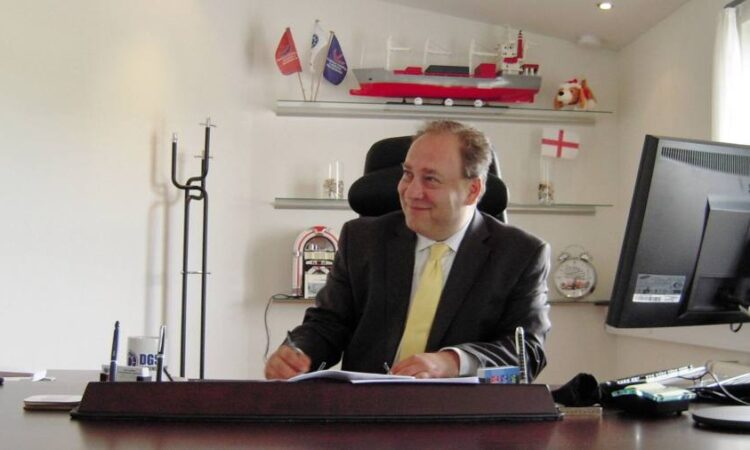
A former British marine insurance salesman and football club owner “kept North Korea’s foreign trade fleet afloat” in apparent violation of UN sanctions, years after the UK government was made aware of suspicions over his activities.
David Skinner, who died in 2016, ran a company called DGS Marine which issued fraudulent insurance certificates for at least 29 North Korean ships in the five years preceding his death, according to documents and emails obtained by Danish newspaper Information and seen by the Financial Times.
“It is no exaggeration to say that for years, David Skinner kept North Korea’s foreign trade fleet afloat,” said Hugh Griffiths, a former co-ordinator of the UN panel that monitors North Korea sanctions.
A former employee of the company told Information that the true number of North Korean ships that were issued certificates by the company was closer to 100.
The certificates were fraudulent because DGS Marine was not licensed to issue insurance in any of the jurisdictions from which it operated. Despite this, the certificates were accepted by ports around the world.
DGS Marine was domiciled first in Liechtenstein and then the British Virgin Islands, with operations in the UK, Cyprus, the British Virgin Islands, Dubai, India, Vietnam, Germany and Denmark.
Skinner was a veteran of the marine protection and indemnity industry, according to industry publication TradeWinds. He worked for established marine insurers including Standard, Skuld and West of England, as well as German insurer Hanseatic, before founding DGS Marine in the late 2000s.

In 2014, he became the majority owner of semi-professional football club Greenwich Borough, which under his ownership was sponsored by DGS Marine. The club is best known for launching the career of former Crystal Palace, Arsenal and England striker Ian Wright.
In at least two instances, DGS Marine continued to issue insurance certificates to ships controlled by a North Korean company called Ocean Maritime Management, even after Ocean Maritime Management was targeted by UN Security Council sanctions in 2014 for smuggling weapons to Cuba.
The FT has also seen copies of certificates issued by DGS Marine to two North Korean ships, the Won San 2 and the O Ka San, in June and August 2016 respectively — several months after the UN prohibited the issuing of insurance to any ships sailing under the North Korean flag.
“These were clear and obvious sanctions breaches,” Griffiths told the FT. “UN Security Council resolution 2270 expressly prohibited insuring North Korean ships, and the maritime insurance communities had been made aware of this.”
Internal documents from DGS Marine show that its relationship with the North Koreans was established in 2011, when the company held a meeting in London with representatives of the Korea National Insurance Corporation (KNIC), North Korea’s state-owned insurance monopoly.
KNIC, which had an office in Blackheath in south-east London, was later sanctioned by the UN and designated as an affiliate of Office 39, a cell within the Workers’ Party of Korea to raise money for the dictatorship’s ruling Kim family.
The UK froze KNIC’s assets in 2017 after the EU accused it of “generating substantial foreign exchange revenue which could contribute to [the country’s] nuclear-related, ballistic missile-related or other weapons of mass destruction-related programmes”.
DGS Marine’s activities were first made public in 2012, when the Telegraph published allegations that Skinner’s company had violated EU sanctions by insuring Iranian ships carrying exports of crude oil from areas controlled by the regime of Syrian dictator Bashar al-Assad.
According to correspondence seen by the FT, UK Treasury officials wrote to DGS Marine about the allegations soon after that.
Skinner responded by sending documents purporting to show that the Iranian tankers’ insurance had been cancelled at the end of 2011, when the EU sanctions came into force.
Weeks later, Treasury officials wrote to Skinner again, this time with evidence received “via colleagues in the US government” that appeared to show that DGS Marine had in fact continued to insure one of the tankers months after the contracts were supposed to have been cancelled.
But the officials appear to have accepted at face value Skinner’s assurances that it was the documentation provided by the US government, rather than those provided by Skinner himself, that had been forged.
“On the basis that the certificate provided to you is indeed a forgery, then we would agree that there is no evidence of any breach by DGS Marine,” an official from the Treasury’s Asset Freezing Unit wrote to Skinner.
DGS Marine continued to operate for another four years, until Skinner’s sudden death in 2016 at the age of 52. Control was passed to his son Nicolas, but the company collapsed soon after. Nicolas Skinner did not respond to a request for comment.
“The UK authorities, as well as EU member states such as Denmark and Cyprus failed to identify DGS Marine as a serial sanctions violator,” said Griffiths. “The UK failure is particularly egregious because they were warned by the US, yet took Skinner at his word.”
The UK Treasury declined to comment on the case but officials noted that the UK had overhauled its enforcement structure from 2016, setting up the Office for Financial Sanctions Implementation and introducing new enforcement powers.
Additional reporting by Chris Cook in London



